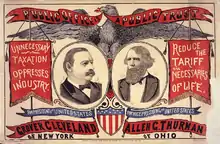Public trust
The concept of the public trust relates back to the origins of democratic government and its seminal idea that within the public lies the true power and future of a society; therefore, whatever trust the public places in its officials must be respected. One of the reasons that bribery is regarded as a notorious evil is that it contributes to a culture of political corruption in which the public trust is eroded. Other issues related to political corruption or betrayal of public trust are lobbying, special interest groups and the public cartel.

Use in the Philippines
In the Philippines, "betrayal of public trust" is one of the impeachable offenses. In Francisco, Jr. vs. Nagmamalasakit na mga Manananggol ng mga Manggagawang Pilipino, Inc., the Supreme Court of the Philippines ruled that the definition of "betrayal of public trust" is "a non-justiciable political question which is beyond the scope of its judicial power" under the Constitution.[1] It did not prescribe which branch of government has the power to define it, but implies that Congress, which handles impeachment cases, has the power to do so.
See also
References
- Francisco, Jr. v. Nagmamalasakit na mga Manananggol ng mga Manggagawang Pilipino, Inc., 415 SCRA 44, 105 (Supreme Court 2003).